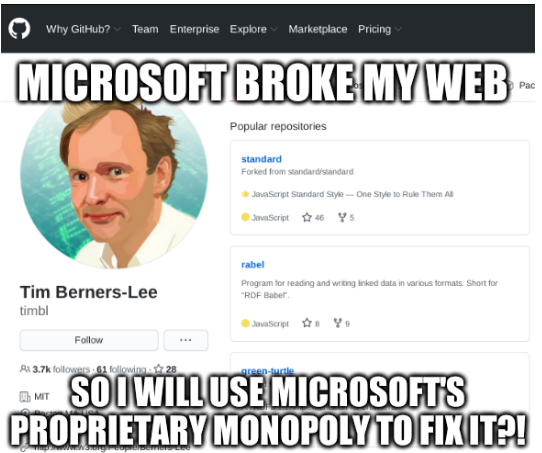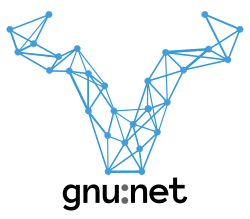

THE DAYS of ActiveX may be behind us (more on that when we revisit deposition tapes, then scrutinise the contents).
"We've long explored alternatives to the World Wide Web..."Flash? Well, it's gone like Adobe Shockwave, but in its place we now have DRM/EME and YouTube is practically inaccessible without a big pile of JavaScript. Most Web browsers I use in 2020 are no longer allowed anywhere near YouTube (it worked fine last year, but of course Google had to break it). Konqueror and QupZilla receive no love from YouTube any longer, but then again, remember that a couple of decades ago video on the Web typically meant downloading a bunch of Windows Media Player files, which would barely be playable on GNU/Linux (RealPlayer was hardly better). Days ago youtube-dl became broken again (Google's fault, API changes apparently), which means that Techrights is waiting for a fix and isn't publishing a bunch of planned videos (except Bill Gates deposition tapes, converted to Ogg format over a decade back).
The Web is not improving. Each time we think there's a "win" for the so-called "Open Web" (like Adobe burying Flash officially this year, being the Trash Player that it is) there are actually new setbacks, including IRC being replaced with JavaScript-intensive tools of corporate espionage. A lot of today's World Wide Web -- like the Internet at large -- is a massive surveillance machine. We've long explored alternatives to the World Wide Web (we're still constantly looking and assessing substitutes), as HTTPS alone hardly tackles the big issues and many use certificates of questionable legitimacy "because it's free!" (No, it's not; nothing is really free when there are operational costs and considering the Linux Foundation's biggest sponsors we know it's all about 'surveillance capitalism' or companies with spying interests)

It may take another decade or two for the "Web" (WWW) as we know it to be phased out, probably for something better (or more malicious, depending on our action/inaction) to gradually replace it. We cannot predict the nature of this thing, but it won't be Gopher and we rarely move in the direction of growing simplicity, only growing complexity and obfuscations. To a lot of people around the world the "Web" is synonymous with "Facebook" and Facebook went out of its way to ensure people never navigative out of Facebook (or that moreover they use Facebook as their ISP/VPN).
There's a lot of sinister stuff going on behind the scenes, putting aside the fact that Facebook wheels its data to Microsoft by the truckload. The Linux Foundation further encourages such "data sharing" (mass surveillance euphemised), as we noted last year.
Very few geeks will challenge the allegation that the "Web" (HTTP/2 or later) went the wrong way; what's sorely needed is a good alternative that can gain inertia/momentum. The creator of the Web (Tim Berners-Lee) foolishly enough put his own alternative in Microsoft's proprietary trap (GitHub). Can he not remember what Microsoft did to his 'baby'? Pure sabotage.

Keep an eye on GNUnet, which Wikipedia describes as follows: "GNUnet is a software framework for decentralized, peer-to-peer networking and an official GNU package. The framework offers link encryption, peer discovery, resource allocation, communication over many transports (such as TCP, UDP, HTTP, HTTPS, WLAN and Bluetooth) and various basic peer-to-peer algorithms for routing, multicast and network size estimation.
 GNUnet's basic network topology is that of a mesh network. GNUnet includes a distributed hash table (DHT) which is a randomized variant of Kademlia that can still efficiently route in small-world networks. GNUnet offers a "F2F topology" option for restricting connections to only the users' trusted friends. The users' friends' own friends (and so on) can then indirectly exchange files with the users' computer, never using its IP address directly.
GNUnet's basic network topology is that of a mesh network. GNUnet includes a distributed hash table (DHT) which is a randomized variant of Kademlia that can still efficiently route in small-world networks. GNUnet offers a "F2F topology" option for restricting connections to only the users' trusted friends. The users' friends' own friends (and so on) can then indirectly exchange files with the users' computer, never using its IP address directly.
GNUnet uses Uniform resource identifiers (not approved by IANA, although an application has been made). GNUnet URIs consist of two major parts: the module and the module specific identifier. A GNUnet URI is of form
gnunet://module/identifier where module is the module name and identifier is a module specific string."
Keep a close eye on GNUnet; we're always eager to defect away from the broken "Web" and hop onto something else, whatever it may be. ⬆